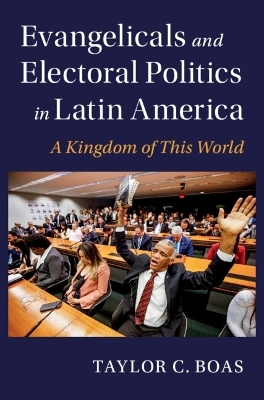
Evangelicals and Electoral Politics in Latin America
A Kingdom of This World
Seiten
2023
Cambridge University Press (Verlag)
978-1-009-27507-1 (ISBN)
Cambridge University Press (Verlag)
978-1-009-27507-1 (ISBN)
Why are religious minorities well represented and influential in some democracies but not others? This book analyses evangelical Christians over more than a century in Brazil, Chile, Colombia, Costa Rica, Guatemala, and Peru, examining the historical struggle for religious equality and contemporary battles over abortion and LGBTQ rights.
Why are religious minorities well represented and politically influential in some democracies but not others? Focusing on evangelical Christians in Latin America, this book argues that religious minorities seek and gain electoral representation when they face significant threats to their material interests and worldview, and when their community is not internally divided by cross-cutting cleavages. Differences in Latin American evangelicals' political ambitions emerged as a result of two critical junctures: episodes of secular reform in the early twentieth century and the rise of sexuality politics at the turn of the twenty-first. In Brazil, significant threats at both junctures prompted extensive electoral mobilization; in Chile, minimal threats meant that mobilization lagged. In Peru, where major cleavages divide both evangelicals and broader society, threats prompt less electoral mobilization than otherwise expected. The multi-method argument leverages interviews, content analysis, survey experiments, ecological analysis, and secondary case studies of Colombia, Costa Rica, and Guatemala.
Why are religious minorities well represented and politically influential in some democracies but not others? Focusing on evangelical Christians in Latin America, this book argues that religious minorities seek and gain electoral representation when they face significant threats to their material interests and worldview, and when their community is not internally divided by cross-cutting cleavages. Differences in Latin American evangelicals' political ambitions emerged as a result of two critical junctures: episodes of secular reform in the early twentieth century and the rise of sexuality politics at the turn of the twenty-first. In Brazil, significant threats at both junctures prompted extensive electoral mobilization; in Chile, minimal threats meant that mobilization lagged. In Peru, where major cleavages divide both evangelicals and broader society, threats prompt less electoral mobilization than otherwise expected. The multi-method argument leverages interviews, content analysis, survey experiments, ecological analysis, and secondary case studies of Colombia, Costa Rica, and Guatemala.
Taylor C. Boas is Associate Professor of Political Science and Latin American Studies at Boston University. He is author of Presidential Campaigns in Latin America: Electoral Strategies and Success Contagion (2016).
1. Explaining Evangelical Representation; 2. Voting Behavior and Political Institutions; 3. Growth, Diversity, and Political Theology; 4. Threats and Political Engagement in Brazil; 5. Comfort and Political Quiescence in Chile; 6. Cleavages and Political Ambivalence in Peru; 7. Conclusions and Comparative Perspectives.
| Erscheinungsdatum | 18.01.2023 |
|---|---|
| Reihe/Serie | Cambridge Studies in Social Theory, Religion and Politics |
| Zusatzinfo | Worked examples or Exercises |
| Verlagsort | Cambridge |
| Sprache | englisch |
| Maße | 158 x 235 mm |
| Gewicht | 650 g |
| Themenwelt | Geisteswissenschaften ► Religion / Theologie |
| Sozialwissenschaften ► Politik / Verwaltung ► Vergleichende Politikwissenschaften | |
| ISBN-10 | 1-009-27507-0 / 1009275070 |
| ISBN-13 | 978-1-009-27507-1 / 9781009275071 |
| Zustand | Neuware |
| Haben Sie eine Frage zum Produkt? |
Mehr entdecken
aus dem Bereich
aus dem Bereich
Geschichte, Parteistruktur, Radikalisierung
Buch | Softcover (2024)
UTB (Verlag)
CHF 38,95


